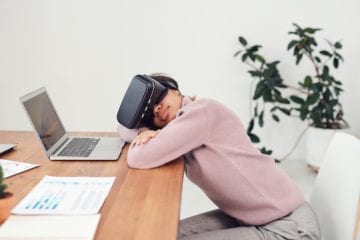If you’re struggling with stress, anxiety or symptoms of depression, you’re not alone. According to the World Health Organization, 1 in 4 of us will be affected by a mental health disorder at some point in our lives.
Poor mental health can affect all areas of our lives – whether you’re struggling to concentrate at work, finding it difficult to make decisions or avoiding social situations. While traditional treatments, such as cognitive-behavioral therapy, are effective for treating mental health conditions, this type of treatment can be challenging for those who struggle to discuss personal matters with a stranger.

In the past ten years, virtual reality (VR) technology has become a successful tool in improving mental health, providing a flexible and affordable solution for treatment.
VR is more than a gaming system
Virtual reality isn’t just a gaming experience. Recent scientific research demonstrates that virtual reality can be used therapeutically to treat a range of conditions, from social anxiety and phobias to neurological disorders and addiction.

What is VR therapy?
Virtual reality therapy helps to treat patients by placing them in a believable world which simulates realistic or otherwise impossible situations. By encountering these digital simulations, you can experience mind-opening scenarios to understand yourself and practice healthier behaviors.
VR therapy has demonstrated positive outcomes by:
1. Delivering highly effective treatments
VR therapy used in clinical trials has shown to provide fast, long-lasting results, and may even be more effective than face to face treatment. One research study found that VR therapy reduced a fear of heights by almost 70% in those with a clinical diagnosis.
2. Providing an improved mental health experience
Using virtual scenarios instead of real life situations can help you to feel more confident about tackling your fears. A study on social anxiety found VR therapy was effective immediately after treatment as well as 6 months later. Changes which resulted from VR therapy lasted longer than standard methods of therapy.
The immersive nature of VR therapy tends to make this type of treatment more engaging than traditional cognitive behavioral therapy (CBT).
3. Offering a drug-free resolution
VR therapy is a drug-free solution, meaning you don’t have to worry about the side effects or the expense of medication. For many, virtual reality therapy is a fun exercise, helping you to overcome your worries and reach your goals. Studies have noted that virtual reality is often relaxing, and applications that are based on a cognitive behavioral therapy model help to divert attention away from stressful thoughts.
4. Delivering private therapy
Almost two thirds of people with a mental health disorder never ask for help. VR therapy enables you to receive effective treatment without being on a long waiting list or working with a therapist for a long period of time. In this study on a fear of heights, the total time of VR treatment delivered was two hours (on average). In comparison to the six hours it would take for traditional face to face therapy, VR therapy is a faster solution. Additionally, as VR therapy is self-guided, you don’t need to feel apprehensive about sharing personal thoughts with a stranger.
5. Learning new behaviors
Recent research has shown that training for a task in VR can improve performance up to 83% over standard training methods.
How do immersive experiences help?
A clinical trial aimed at helping people with paranoia placed the patient in public places, such as a crowded bus or coffee shop. The VR CBT (cognitive behavioral therapy) treatment allowed researchers to customize avatars and alter the friendliness levels of those within a scenario so patients could pace their progress.
By confronting your fears in a virtual setting, you’ll gain the confidence required to face them in a real-life setting. This form of therapy simulates real life in a controllable setting, allowing you to regain control and the freedom to live life how you want to.
The benefits of a healthy mind
Our mental health aids our psychological and emotional well-being, determining how we think and feel. Working on ways to establish a healthier mindset offers many benefits, including:
1. A better response to stress
Stress negatively impacts many parts of the body, including the immune system. With improved mental health, you feel less anxious and you’re able to think clearly so you can manage stressful situations. For example, when you’re feeling anxious, you may find unexpected situations very stressful. However, when you’ve built up your resilience with an improved mindset, you’ll be able to handle these challenges much more positively.
2. Improved cognitive performance
High cognitive performance has been associated with improved mental health. With a healthier mindset, you feel less stressed and anxious, helping you to think clearer and attain your goals. You no longer are working against yourself and can achieve your peak performance in any situation.
3. Increased self-esteem
Research has shown that poor self-esteem can lead to mental health issues and a poor quality of life. However, working on improving your mental health can increase self-esteem as you’re able to maintain relationships, adapt better to change, and bounce back from negative situations.
4. A happier mood
The Origins of Happiness report suggested that eliminating mental health issues would increase happiness by 20%. Enhancing your mental well-being produces a happier, healthier mood, so you feel more content in everyday life.
5. Better sleep
Sleep issues are more likely to affect those with psychiatric problems. When you’re feeling stressed or anxious, you struggle to doze off. 43% of Americans aged 13 to 64 have reported not being able to sleep due to stress. When you’re feeling less stressed, thanks to better mental health, you’re able to sleep better and wake up feeling refreshed and ready to take on the day ahead.
Presence VR: the path to a more fulfilling way of life
If you want to feel happier and more focused on achieving your goals, take a look at Presence: the immersive therapy that can help you to take control of your mental well-being.


